Professional Philosophy of Nursing
VerifiedAdded on 2023/01/18
|6
|1501
|67
AI Summary
This article discusses the personal philosophy of nursing and the importance of person-centered care. It explores the role of psychology in nursing and the skills required for effective healthcare. The author reflects on their learning experience and outlines their goals for providing patient-centered care.
Contribute Materials
Your contribution can guide someone’s learning journey. Share your
documents today.
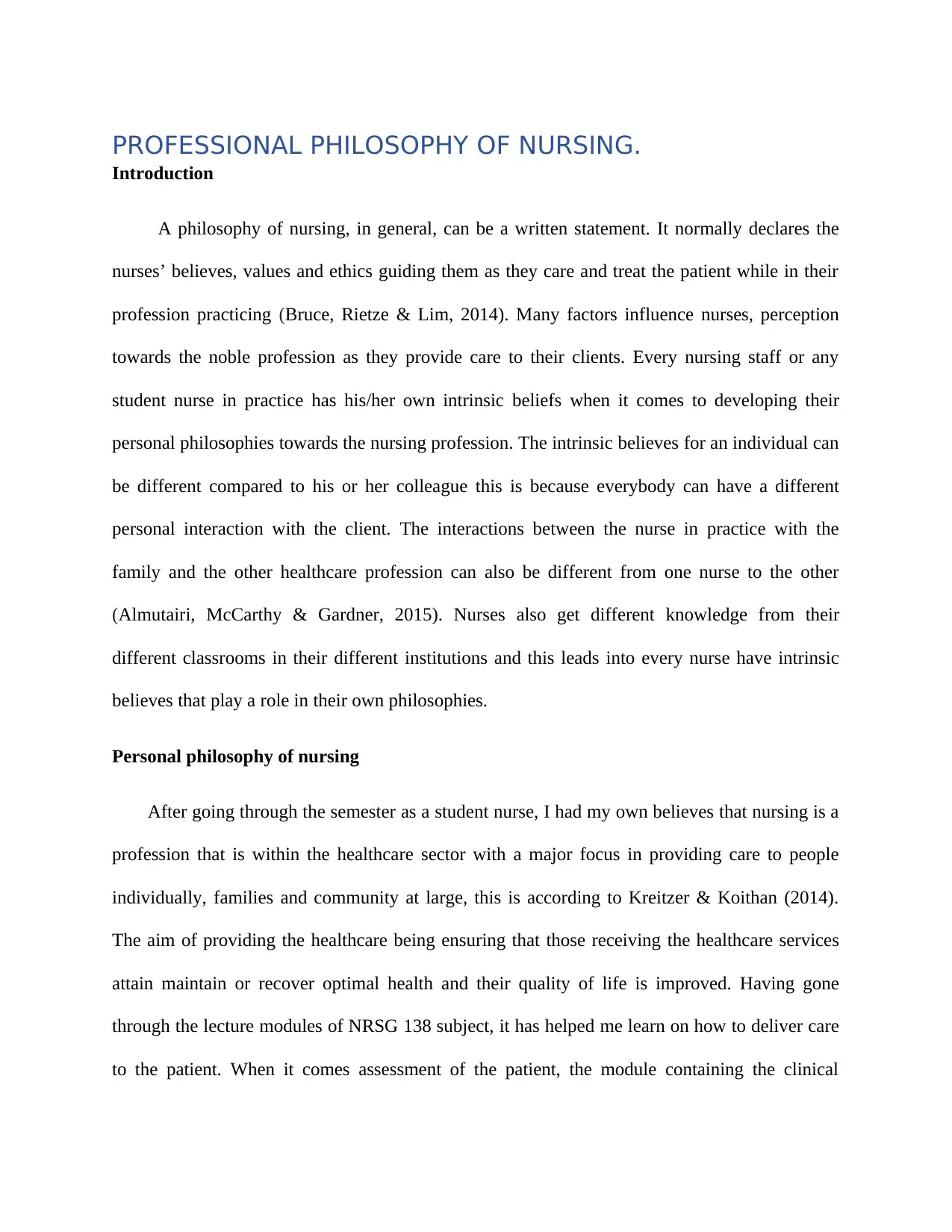
PROFESSIONAL PHILOSOPHY OF NURSING.
Introduction
A philosophy of nursing, in general, can be a written statement. It normally declares the
nurses’ believes, values and ethics guiding them as they care and treat the patient while in their
profession practicing (Bruce, Rietze & Lim, 2014). Many factors influence nurses, perception
towards the noble profession as they provide care to their clients. Every nursing staff or any
student nurse in practice has his/her own intrinsic beliefs when it comes to developing their
personal philosophies towards the nursing profession. The intrinsic believes for an individual can
be different compared to his or her colleague this is because everybody can have a different
personal interaction with the client. The interactions between the nurse in practice with the
family and the other healthcare profession can also be different from one nurse to the other
(Almutairi, McCarthy & Gardner, 2015). Nurses also get different knowledge from their
different classrooms in their different institutions and this leads into every nurse have intrinsic
believes that play a role in their own philosophies.
Personal philosophy of nursing
After going through the semester as a student nurse, I had my own believes that nursing is a
profession that is within the healthcare sector with a major focus in providing care to people
individually, families and community at large, this is according to Kreitzer & Koithan (2014).
The aim of providing the healthcare being ensuring that those receiving the healthcare services
attain maintain or recover optimal health and their quality of life is improved. Having gone
through the lecture modules of NRSG 138 subject, it has helped me learn on how to deliver care
to the patient. When it comes assessment of the patient, the module containing the clinical
Introduction
A philosophy of nursing, in general, can be a written statement. It normally declares the
nurses’ believes, values and ethics guiding them as they care and treat the patient while in their
profession practicing (Bruce, Rietze & Lim, 2014). Many factors influence nurses, perception
towards the noble profession as they provide care to their clients. Every nursing staff or any
student nurse in practice has his/her own intrinsic beliefs when it comes to developing their
personal philosophies towards the nursing profession. The intrinsic believes for an individual can
be different compared to his or her colleague this is because everybody can have a different
personal interaction with the client. The interactions between the nurse in practice with the
family and the other healthcare profession can also be different from one nurse to the other
(Almutairi, McCarthy & Gardner, 2015). Nurses also get different knowledge from their
different classrooms in their different institutions and this leads into every nurse have intrinsic
believes that play a role in their own philosophies.
Personal philosophy of nursing
After going through the semester as a student nurse, I had my own believes that nursing is a
profession that is within the healthcare sector with a major focus in providing care to people
individually, families and community at large, this is according to Kreitzer & Koithan (2014).
The aim of providing the healthcare being ensuring that those receiving the healthcare services
attain maintain or recover optimal health and their quality of life is improved. Having gone
through the lecture modules of NRSG 138 subject, it has helped me learn on how to deliver care
to the patient. When it comes assessment of the patient, the module containing the clinical
Secure Best Marks with AI Grader
Need help grading? Try our AI Grader for instant feedback on your assignments.
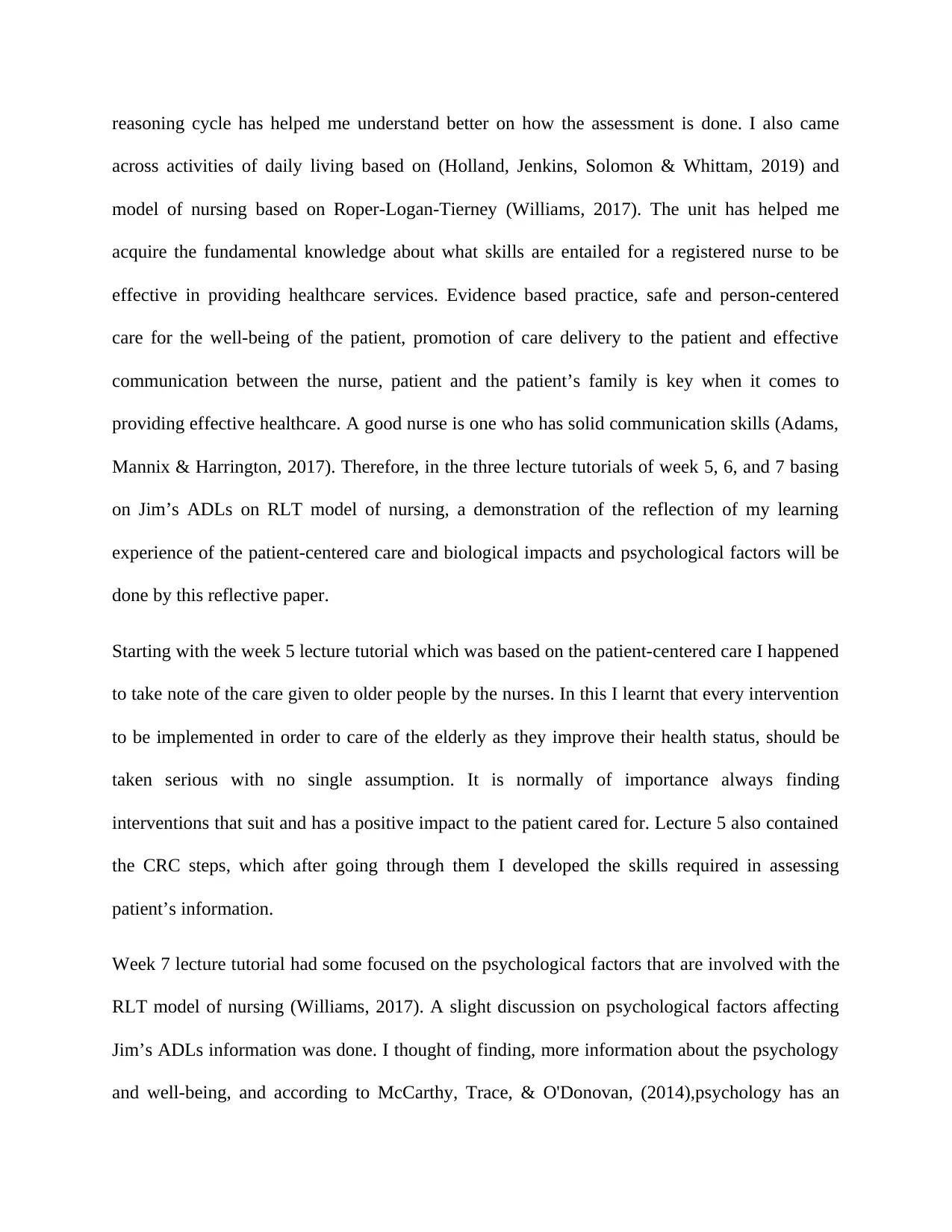
reasoning cycle has helped me understand better on how the assessment is done. I also came
across activities of daily living based on (Holland, Jenkins, Solomon & Whittam, 2019) and
model of nursing based on Roper-Logan-Tierney (Williams, 2017). The unit has helped me
acquire the fundamental knowledge about what skills are entailed for a registered nurse to be
effective in providing healthcare services. Evidence based practice, safe and person-centered
care for the well-being of the patient, promotion of care delivery to the patient and effective
communication between the nurse, patient and the patient’s family is key when it comes to
providing effective healthcare. A good nurse is one who has solid communication skills (Adams,
Mannix & Harrington, 2017). Therefore, in the three lecture tutorials of week 5, 6, and 7 basing
on Jim’s ADLs on RLT model of nursing, a demonstration of the reflection of my learning
experience of the patient-centered care and biological impacts and psychological factors will be
done by this reflective paper.
Starting with the week 5 lecture tutorial which was based on the patient-centered care I happened
to take note of the care given to older people by the nurses. In this I learnt that every intervention
to be implemented in order to care of the elderly as they improve their health status, should be
taken serious with no single assumption. It is normally of importance always finding
interventions that suit and has a positive impact to the patient cared for. Lecture 5 also contained
the CRC steps, which after going through them I developed the skills required in assessing
patient’s information.
Week 7 lecture tutorial had some focused on the psychological factors that are involved with the
RLT model of nursing (Williams, 2017). A slight discussion on psychological factors affecting
Jim’s ADLs information was done. I thought of finding, more information about the psychology
and well-being, and according to McCarthy, Trace, & O'Donovan, (2014),psychology has an
across activities of daily living based on (Holland, Jenkins, Solomon & Whittam, 2019) and
model of nursing based on Roper-Logan-Tierney (Williams, 2017). The unit has helped me
acquire the fundamental knowledge about what skills are entailed for a registered nurse to be
effective in providing healthcare services. Evidence based practice, safe and person-centered
care for the well-being of the patient, promotion of care delivery to the patient and effective
communication between the nurse, patient and the patient’s family is key when it comes to
providing effective healthcare. A good nurse is one who has solid communication skills (Adams,
Mannix & Harrington, 2017). Therefore, in the three lecture tutorials of week 5, 6, and 7 basing
on Jim’s ADLs on RLT model of nursing, a demonstration of the reflection of my learning
experience of the patient-centered care and biological impacts and psychological factors will be
done by this reflective paper.
Starting with the week 5 lecture tutorial which was based on the patient-centered care I happened
to take note of the care given to older people by the nurses. In this I learnt that every intervention
to be implemented in order to care of the elderly as they improve their health status, should be
taken serious with no single assumption. It is normally of importance always finding
interventions that suit and has a positive impact to the patient cared for. Lecture 5 also contained
the CRC steps, which after going through them I developed the skills required in assessing
patient’s information.
Week 7 lecture tutorial had some focused on the psychological factors that are involved with the
RLT model of nursing (Williams, 2017). A slight discussion on psychological factors affecting
Jim’s ADLs information was done. I thought of finding, more information about the psychology
and well-being, and according to McCarthy, Trace, & O'Donovan, (2014),psychology has an
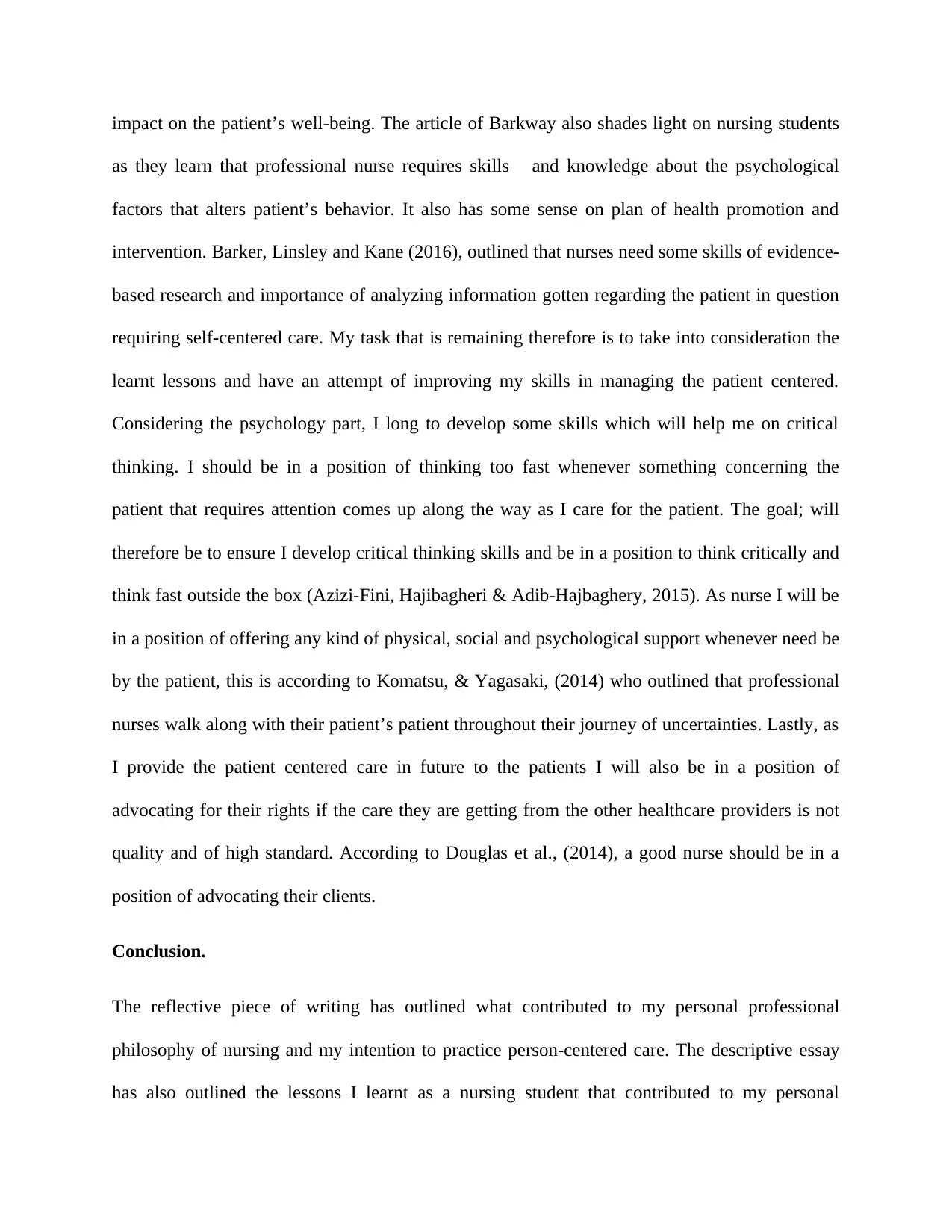
impact on the patient’s well-being. The article of Barkway also shades light on nursing students
as they learn that professional nurse requires skills and knowledge about the psychological
factors that alters patient’s behavior. It also has some sense on plan of health promotion and
intervention. Barker, Linsley and Kane (2016), outlined that nurses need some skills of evidence-
based research and importance of analyzing information gotten regarding the patient in question
requiring self-centered care. My task that is remaining therefore is to take into consideration the
learnt lessons and have an attempt of improving my skills in managing the patient centered.
Considering the psychology part, I long to develop some skills which will help me on critical
thinking. I should be in a position of thinking too fast whenever something concerning the
patient that requires attention comes up along the way as I care for the patient. The goal; will
therefore be to ensure I develop critical thinking skills and be in a position to think critically and
think fast outside the box (Azizi-Fini, Hajibagheri & Adib-Hajbaghery, 2015). As nurse I will be
in a position of offering any kind of physical, social and psychological support whenever need be
by the patient, this is according to Komatsu, & Yagasaki, (2014) who outlined that professional
nurses walk along with their patient’s patient throughout their journey of uncertainties. Lastly, as
I provide the patient centered care in future to the patients I will also be in a position of
advocating for their rights if the care they are getting from the other healthcare providers is not
quality and of high standard. According to Douglas et al., (2014), a good nurse should be in a
position of advocating their clients.
Conclusion.
The reflective piece of writing has outlined what contributed to my personal professional
philosophy of nursing and my intention to practice person-centered care. The descriptive essay
has also outlined the lessons I learnt as a nursing student that contributed to my personal
as they learn that professional nurse requires skills and knowledge about the psychological
factors that alters patient’s behavior. It also has some sense on plan of health promotion and
intervention. Barker, Linsley and Kane (2016), outlined that nurses need some skills of evidence-
based research and importance of analyzing information gotten regarding the patient in question
requiring self-centered care. My task that is remaining therefore is to take into consideration the
learnt lessons and have an attempt of improving my skills in managing the patient centered.
Considering the psychology part, I long to develop some skills which will help me on critical
thinking. I should be in a position of thinking too fast whenever something concerning the
patient that requires attention comes up along the way as I care for the patient. The goal; will
therefore be to ensure I develop critical thinking skills and be in a position to think critically and
think fast outside the box (Azizi-Fini, Hajibagheri & Adib-Hajbaghery, 2015). As nurse I will be
in a position of offering any kind of physical, social and psychological support whenever need be
by the patient, this is according to Komatsu, & Yagasaki, (2014) who outlined that professional
nurses walk along with their patient’s patient throughout their journey of uncertainties. Lastly, as
I provide the patient centered care in future to the patients I will also be in a position of
advocating for their rights if the care they are getting from the other healthcare providers is not
quality and of high standard. According to Douglas et al., (2014), a good nurse should be in a
position of advocating their clients.
Conclusion.
The reflective piece of writing has outlined what contributed to my personal professional
philosophy of nursing and my intention to practice person-centered care. The descriptive essay
has also outlined the lessons I learnt as a nursing student that contributed to my personal
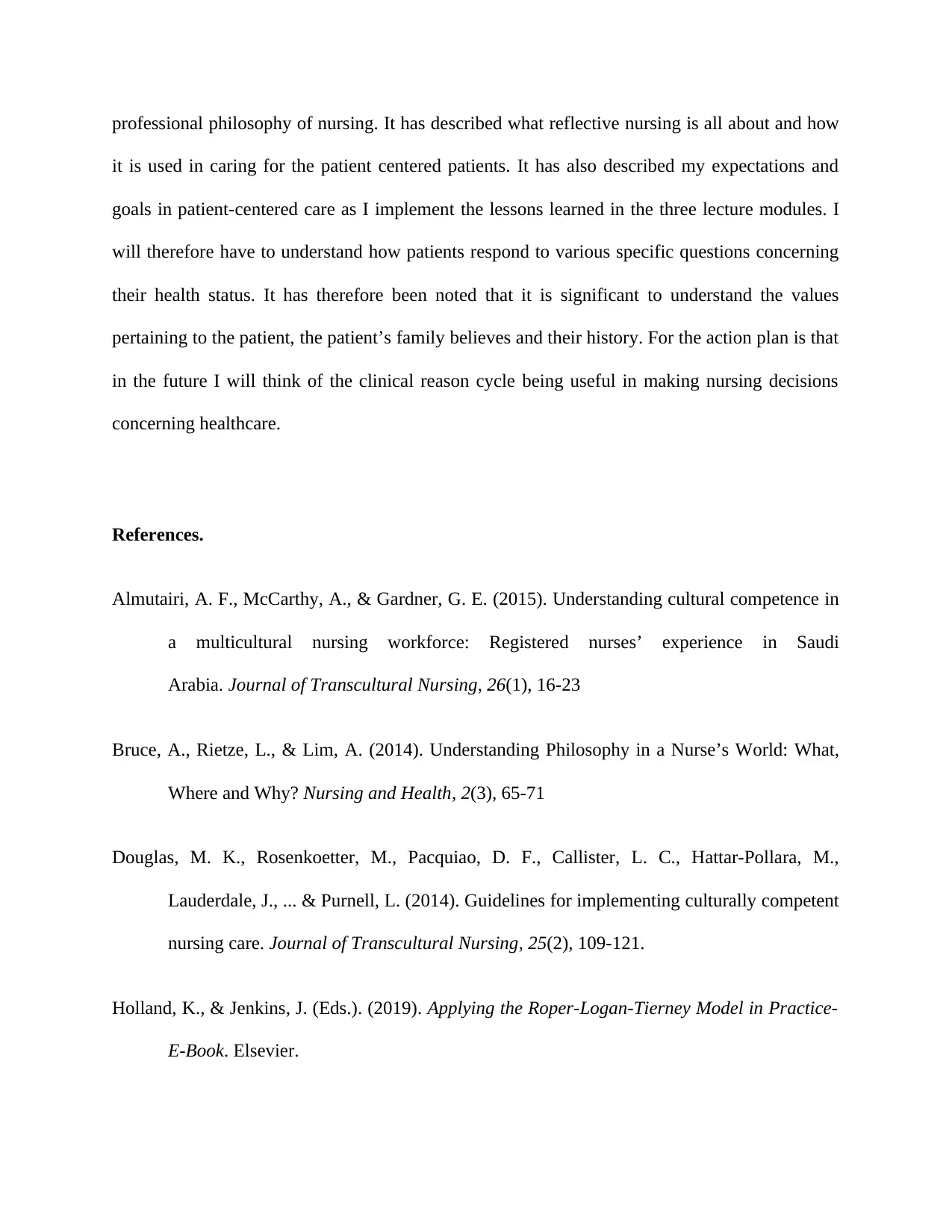
professional philosophy of nursing. It has described what reflective nursing is all about and how
it is used in caring for the patient centered patients. It has also described my expectations and
goals in patient-centered care as I implement the lessons learned in the three lecture modules. I
will therefore have to understand how patients respond to various specific questions concerning
their health status. It has therefore been noted that it is significant to understand the values
pertaining to the patient, the patient’s family believes and their history. For the action plan is that
in the future I will think of the clinical reason cycle being useful in making nursing decisions
concerning healthcare.
References.
Almutairi, A. F., McCarthy, A., & Gardner, G. E. (2015). Understanding cultural competence in
a multicultural nursing workforce: Registered nurses’ experience in Saudi
Arabia. Journal of Transcultural Nursing, 26(1), 16-23
Bruce, A., Rietze, L., & Lim, A. (2014). Understanding Philosophy in a Nurse’s World: What,
Where and Why? Nursing and Health, 2(3), 65-71
Douglas, M. K., Rosenkoetter, M., Pacquiao, D. F., Callister, L. C., Hattar-Pollara, M.,
Lauderdale, J., ... & Purnell, L. (2014). Guidelines for implementing culturally competent
nursing care. Journal of Transcultural Nursing, 25(2), 109-121.
Holland, K., & Jenkins, J. (Eds.). (2019). Applying the Roper-Logan-Tierney Model in Practice-
E-Book. Elsevier.
it is used in caring for the patient centered patients. It has also described my expectations and
goals in patient-centered care as I implement the lessons learned in the three lecture modules. I
will therefore have to understand how patients respond to various specific questions concerning
their health status. It has therefore been noted that it is significant to understand the values
pertaining to the patient, the patient’s family believes and their history. For the action plan is that
in the future I will think of the clinical reason cycle being useful in making nursing decisions
concerning healthcare.
References.
Almutairi, A. F., McCarthy, A., & Gardner, G. E. (2015). Understanding cultural competence in
a multicultural nursing workforce: Registered nurses’ experience in Saudi
Arabia. Journal of Transcultural Nursing, 26(1), 16-23
Bruce, A., Rietze, L., & Lim, A. (2014). Understanding Philosophy in a Nurse’s World: What,
Where and Why? Nursing and Health, 2(3), 65-71
Douglas, M. K., Rosenkoetter, M., Pacquiao, D. F., Callister, L. C., Hattar-Pollara, M.,
Lauderdale, J., ... & Purnell, L. (2014). Guidelines for implementing culturally competent
nursing care. Journal of Transcultural Nursing, 25(2), 109-121.
Holland, K., & Jenkins, J. (Eds.). (2019). Applying the Roper-Logan-Tierney Model in Practice-
E-Book. Elsevier.
Secure Best Marks with AI Grader
Need help grading? Try our AI Grader for instant feedback on your assignments.
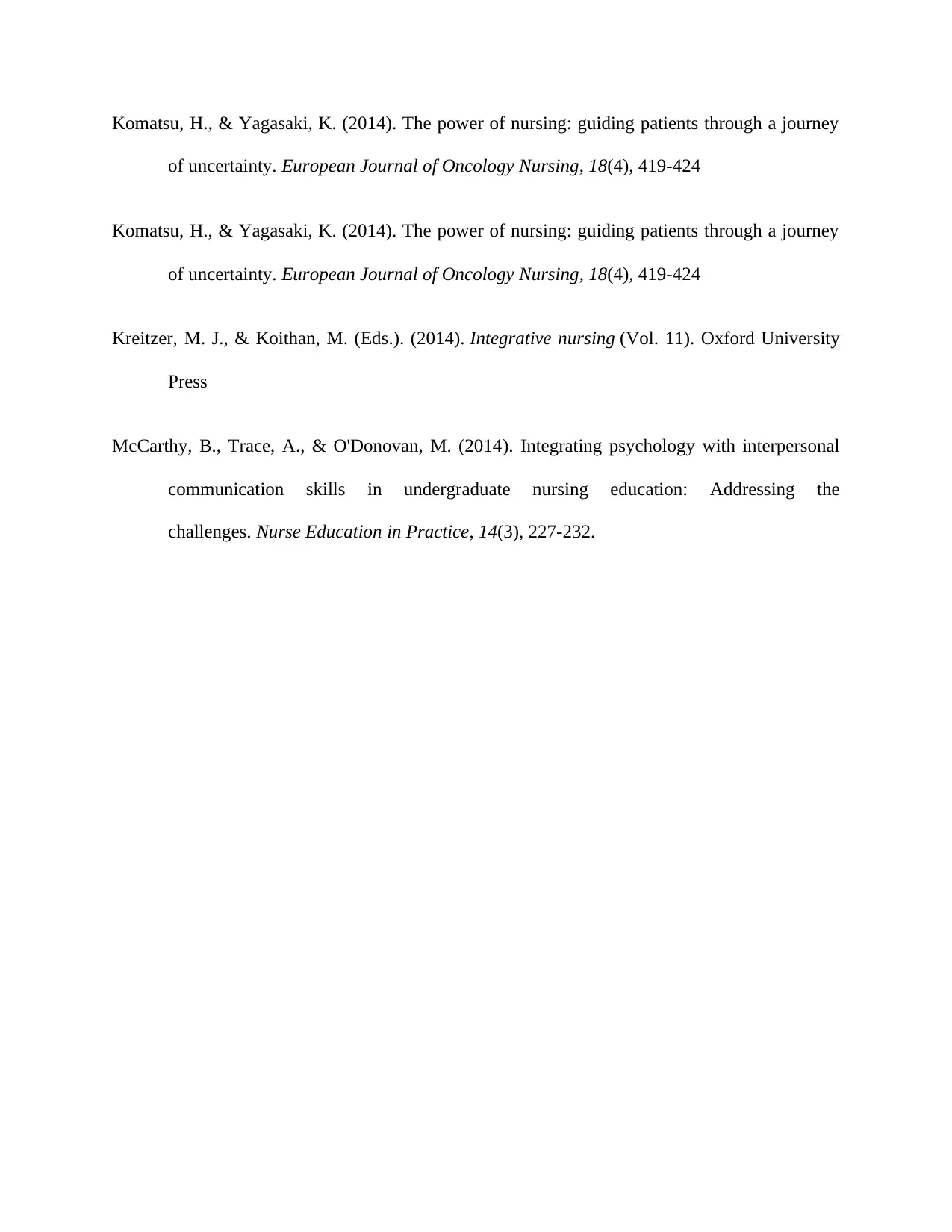
Komatsu, H., & Yagasaki, K. (2014). The power of nursing: guiding patients through a journey
of uncertainty. European Journal of Oncology Nursing, 18(4), 419-424
Komatsu, H., & Yagasaki, K. (2014). The power of nursing: guiding patients through a journey
of uncertainty. European Journal of Oncology Nursing, 18(4), 419-424
Kreitzer, M. J., & Koithan, M. (Eds.). (2014). Integrative nursing (Vol. 11). Oxford University
Press
McCarthy, B., Trace, A., & O'Donovan, M. (2014). Integrating psychology with interpersonal
communication skills in undergraduate nursing education: Addressing the
challenges. Nurse Education in Practice, 14(3), 227-232.
of uncertainty. European Journal of Oncology Nursing, 18(4), 419-424
Komatsu, H., & Yagasaki, K. (2014). The power of nursing: guiding patients through a journey
of uncertainty. European Journal of Oncology Nursing, 18(4), 419-424
Kreitzer, M. J., & Koithan, M. (Eds.). (2014). Integrative nursing (Vol. 11). Oxford University
Press
McCarthy, B., Trace, A., & O'Donovan, M. (2014). Integrating psychology with interpersonal
communication skills in undergraduate nursing education: Addressing the
challenges. Nurse Education in Practice, 14(3), 227-232.

1 out of 6
Related Documents
Your All-in-One AI-Powered Toolkit for Academic Success.
+13062052269
info@desklib.com
Available 24*7 on WhatsApp / Email
![[object Object]](/_next/static/media/star-bottom.7253800d.svg)
Unlock your academic potential
© 2024 | Zucol Services PVT LTD | All rights reserved.





